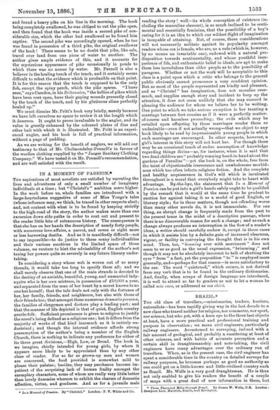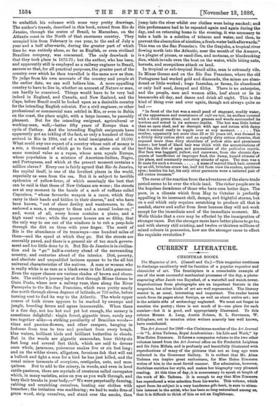BRAZIL.* Tux old class of travellers,—missionaries, traders, hunters, naturalists—has been
rapidly giving way in the last decade to a new class who travel neither for religion, nor commerce, nor sport, nor science, but who yet, with a keen eye to the three last objects at least, have a more practical and professional training and purpose in observation ; we mean civil engineers, particularly railway engineers. Accustomed to surveying, imbued with a fair amount of geological, and probably a smattering at least of other sciences, and with habits of accurate perception and a certain skill in draughtsmanship and note-taking, the civil engineers have many advantages over the ordinary run of travellers. When, as in the present case, the civil engineer has spent a considerable time in the country on detailed surveys for railway purposes, he becomes perhaps as good an authority as one could get on a little-known and little-civilised country such as Brazil. Mr. Wells is a very good draughtsman. lie is thus not only enabled to give his readers the benefit of a couple of maps with a great deal of new information in them, but
• Thros Thousand man through Brasil. By James W. Well., 0.8. London s Sampson Low, Marston, Searle, and Itivington. to embellish his volumes with some very pretty drawings. The author's travels, described in this book, extend from Rio de Janeiro, through the centre of Brazil, to Maranhao, on the Atlantic coast in the North of that enormous country. They occupied him from February in one year, to the end of July a year and a half afterwards, during the greater part of which time he was entirely alone, so far as English, or even civilised Brazilian company, was concerned. The only drawback is that they took place in 1873-75; but the author, who has been, and apparently still is employed as a railway engineer in Brazil, assures us that, for all practical purposes, the greater part of the country over which he then travelled is the same now as then. To judge from his own accounts of the country and people at the earlier date, we can well believe him. A more appalling country to have to live in, whether on account of Nature or man, can hardly be conceived. Things would have to be very bad indeed in England, and Canada, and New Zealand, and the Cape, before Brazil could be looked upon as a desirable country for the intending English colonist. For a civil engineer, or other professional or commercial man settled in Rio, or even in Bahia on the coast, the place might, with a large income, be passably pleasant. Bat for the intending emigrant, agricultural or working-man, well,—better fifty years of Europe than a cycle of Cathay. And the intending English emigrants have apparently got an inkling of the fact, as only a hundred of them arrived in Rio in 1884, out of a total immigration of 18,000. What could any one expect of a country whose unit of money is a reis, a thousand of which go to form a silver coin of the same nominal value as a rupee, whose area equals Europe, whose population is a mixture of American-Indian, Negro, and Portuguese, and which at the present moment contains a
million slaves Every one is fairly agreed that Rio de Janeiro, the capital itself, is one of the loveliest places in the world, especially as seen from the sea. But it is subject to terrible epidemics of yellow-fever, of which seemingly the best that can be said is that those of New Orleans are worse ; the streets are at any moment in the hands of a mob of ruffians called Capoeiros, "whose favourite weapon is a razor, which they carry in their hands and hidden in their sleeves," and who have been known, "out of sheer devilry and wantonness, to dis- embowel a man, a stranger to them and a casual looker-on ;" and, worst of all, every house contains a piano, and a high nasal voice ; while the poorer houses are so filthy, that the only way to see out of the windows is to rub a peep-hole through the dirt on them with your finger. The merit of Rio is the abundance of its tramways—one hundred miles of them—and the speed at which they go. But the streets are execrably paved, and there is a general air of too much govern- ment and too little done by it. But Rio de Janeiro is in civilisa- tion and in " go " half-a-century ahead of the surrounding country, and centuries ahead of the intericr. Dirt, poverty, and absolute and unqualified laziness appear to be the all but universal characteristics of the natives. A man or woman who is really white is as rare as a black swan in the Latin grammar. Even the upper classes are various shades of brown and choco- late. The anthcr's journey lay at first through Minas Geraes to Ouro Prato, where now a railway runs, then along the River Paraopeba to the Rio Sao Francisco, which runs pretty nearly due north through eleven degrees of latitude, or 7t,0 miles, before turning east to find its way to the Atlantic. The whole upper course of both rivers appears to be marked by swamps and jungle, breeding fevers and agues innumerable. When there is a fine day, not too hot and yet hot enough, the scenery is sometimes delightful : virgin forest, gigantic trees, rarely any two together alike—a striking peculiarity of Brazilian woods— vines and passion-flowers, and other creepers, hanging in festoons from tree to tree and pendant from every bough, blue waters, brilliant birds and brilliant butterflies in clouds. But in the woods are gigantic anacondas, boas thirty-six feet long and several feet thick, which are said to devour oxen whole, jararacas, poisonous snakes five or six feet long ; and on the wilder rivers, alligators, ferocious fish that will eat a bullock and fight a man for a bird he has just killed, and the usual minor torments of scorpions, centipedes, ants, and mos- quitoes. But to add to the misery, in woods, and even in level cattle-pastures, there are myriads of creatures called carrapatos which, in many varieties, seize on you as you walk through, and bury their trunks in your body,—" We were perpetually dancing, rubbing and scratching ourselves, beating our clothes with branches ; the irritation was maddening ; we had to make fires of green wood, strip ourselves, and stand over the smoke, then
jump into the river whilst our clothes were being smoked ; and this performance had to be repeated again and again during the day, and on returning home in the evening, it was necessary to take a bath in a solution of tobacco and water, and then, to
prevent the absorption of nicotine, a fresh-water bath afterwards." This was on the Sao Francisc). On the Grajuhu, a tropical river flowing north into the Atlantic, near the mouth of the Amazor, is a plague of pinms, or sand-flies, and motucas, or bloodsucking flies, which invade even the boat on the water, while biting ants, hornets, and mosquitoes attack on land.
In tropical or sub-tropical Brazil alike, man is extremely vile. In Minas Geraes and on the Rio Sao Francisco, where the old Portuguese had worked gold and diamonds, the mines are aban- doned or little worked ; huge fazendas, or farms, lie abandoned or only half used, decayed and filthy. There is no enterprise,
and the people, men and women alike, loaf about or lie in hammocks all day, and dance and drink all night. This is the kind of thing over and over again, though not always quite BO bad :— "In front of the hut was a small pond of stagnant, muddy water, of the appearanoe and consistence of café-au-last, its surface covered with a thick green slime, and rank grasses and weeds surrounded its borders and rotted in its noisome depths. The hut was little better than an open shed, and so decrepit with age and rotten with damp
that it seemed ready to topple over at any moment The mother, apparently not more than 22 or 25 years old, was dressed in a filthily dirty cotton skirt and an equally dirty cotton chemise, that exposed more than dirty shoulders of yellow skin and prominent bones ; her head of black hair was thick with the accumulations of beef-fat, the dirt of ages, and generations of the pediculus capitis. Her face was haggard, yellow, and careworn, from the chronic dys- pepsia of insufficient or improper food, the damp, humid climate of the place, and constantly recurring attacks of ague. The man was a
fit mate for such a woman A mass of matted black hair, covered by an old, brimless straw bat, half hid from view his sunken, spiritless eyes ; besides his hat, his only other garments were a tattered pair of old cotton trousers."
The curse of the reaction from the adventures of the slave-trade period seems to be over the whole land. The richer people are in the hopeless decadence of those who have seen better days. The poor, in a climate which from May to October is perfectly appalling in its incessant chill, damps, and frightful storms, but on a soil which only requires scratching to produce all that is needed, starve and suffer from fever because they will not work except for the immediate need of the immediate moment. Mr. Wells thinks that a cure may be effected by the immigration of stronger races. Bat the stronger races have better places to go to; and with slavery still existing, and twelve or thirteen millions of mixed colours in possession, how are the stronger races to effect the requisite revolution?



































 Previous page
Previous page